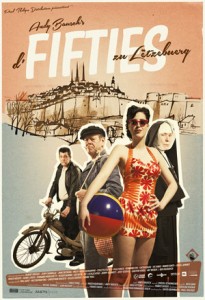Living in a country for nigh ten years does not necessarily mean that you know the place. Yes, you may be able to ditch the GPS and drive around the far flung (!) corners of the Mullerthal or the northern reaches of Clervaux as nonchalantly as you would in the backstreets of Attard or Cospicua. You might even qualify as an experienced tipster on Tripadvisor for the best joints to eat, drink or simply have fun in the Duchy. But do you know where the “locals” are coming from? Do you know what makes them tick?
I jumped at the opportunity to get an insider’s glimpse of the history of the Grand Duchy. Andy Bausch, Luxembourg’s most successful director had a new documentary in the cinemas and in it he was dissecting a very important decade in the history of Luxembourg – the fifties. The blurb promised an eighty minutes rock and roll through a duchy lazily emerging from the wartime damage and being slapped in the face by modernity. So armed with popcorn and Pom’s I settled down to fill in the lacunae I had shamefully let fester in this decade in Luxembourg.
Hall 4 at Utopolis Cinemas wasn’t anywhere close to being full. The sparse crowd was mainly made up of people who had lived the fifties themselves. Ok, there were a few representatives of the younger generation in the crowd but most of the viewers were like the couple sat next to me – local elderly folk eager to see a snapshot of themselves – which turned out to be an additional bonus since I could gauge more info from their reactions.
I could not help thinking what this kind of documentary would highlight were Malta the subject rather than the Grand Duchy, which turned out to be quite an interesting point of departure since the opening minutes were dedicated to the main obsession in postwar Luxembourg: the Catholic Church. I was surprised to see how strong the hold of the Church was on this nation back in the days of La Grande Construction de l’Europe. It turns out that from the rebuilding capital to the remotest villages (duerf) the main reference point was the church and its representatives.
So we got to see the stories of how the curés and nuns seemed to be the measure of what was acceptable and what was not. I was just thinking of an infamous circular by Archbishop Gonzi against the devilish practices of rock and roll dancing when Bausch’s account segued straight into some controversial moments faced by one of the decade’s greatest journals (Revue). Apparently some photos of some ladies practising gymnastics in sport attire had provoked the ire of many a rural priest. No criticism was spared for the Bishop of the time who was described by a famous Luxembourg author (Gaston Vogel) as presumptions “you could see it by the way he strutted around like a peacock” (paoner).
I cannot possibly run through all the different aspects of Luxembourg life that were excellently portrayed in this piece – from the arrival of TV to the almost reluctant participation of the Duchy in the construction of the European Community – but I cannot sufficiently stress how admirably the self-critical tone was handled. Early on Vogel comments on how the nation was a nation of “bauer” (close to boors) who still had an obsession with being navel-gazing – distrusting the outside world. Another commentator whose name sadly escapes me did not hesitate to highlight the “racist” attitude of Luxembourgers to the outside world.
The racism was a combination of distrust of the German neighbours, only too recently enemies at war, to the dislike of the early fonctionnaires of a young Europe. Strikingly the early experience of the minnows of the six founding members of the European Community was marginal. Bar the monumental figures such as Schumann, early jobs for Luxembourgers was as huissiers (marshalls) or administrative secretaries. Vogel condemns this attitude outright and claims that Luxembourg missed out on being the real capital of Europe (and not Brussels) because of some “idiots”. And of course because of the Church. Yes, the Church was not too enamoured with the idea of opening of frontiers and the importation of new “ideas” so it was quite happy with the shift of most institutions to neighbouring Brussels.
This write up can only skim the surface of a wonderfully crafted psychological analysis of a crucial period in the history of a young European state. I can only wish that a similar treatment and dissection can be made of my home country free from the hang-ups and interests of partisan interpretation. You could feel the heartbeat of a nation struggling to come to terms with fifties modernity – from the reactions to the Soviet developments, to the emancipation of women to the atrocious buildings that sprung up in the fifties (Vogel again – “Shits, the lot of them, all the architects).
It’s a two thumbs up for Andy Bausch and his highly recommendable tour de force. There is much for a nation to learn when it holds up the mirror and takes a long, hard and honest look at itself.
Ech sin dofir!

